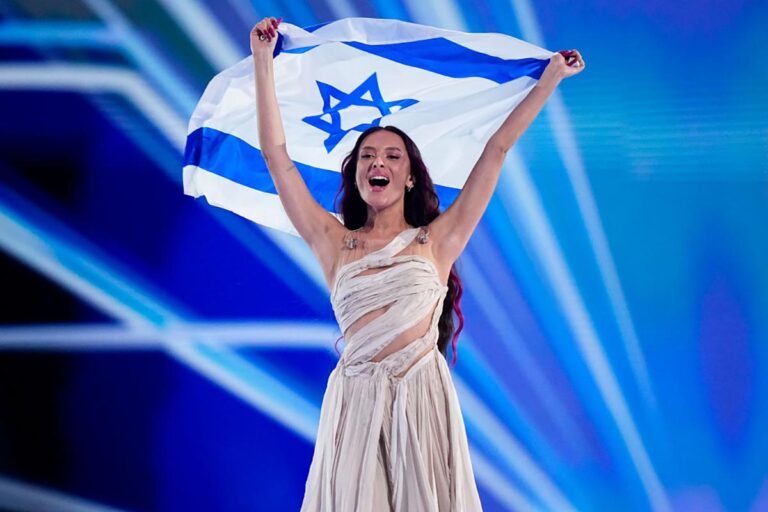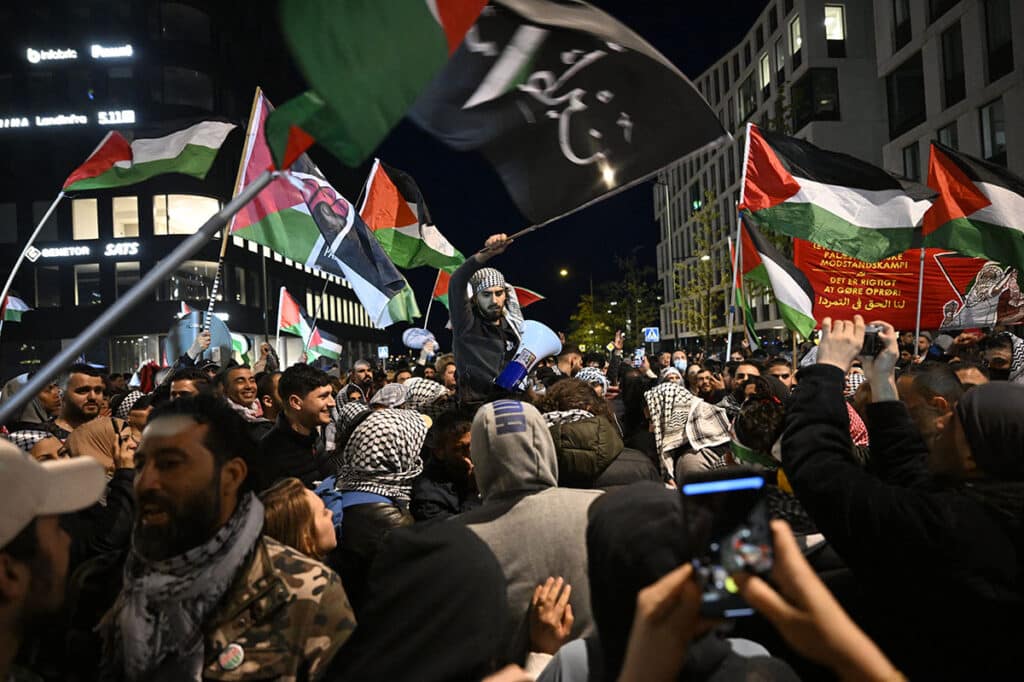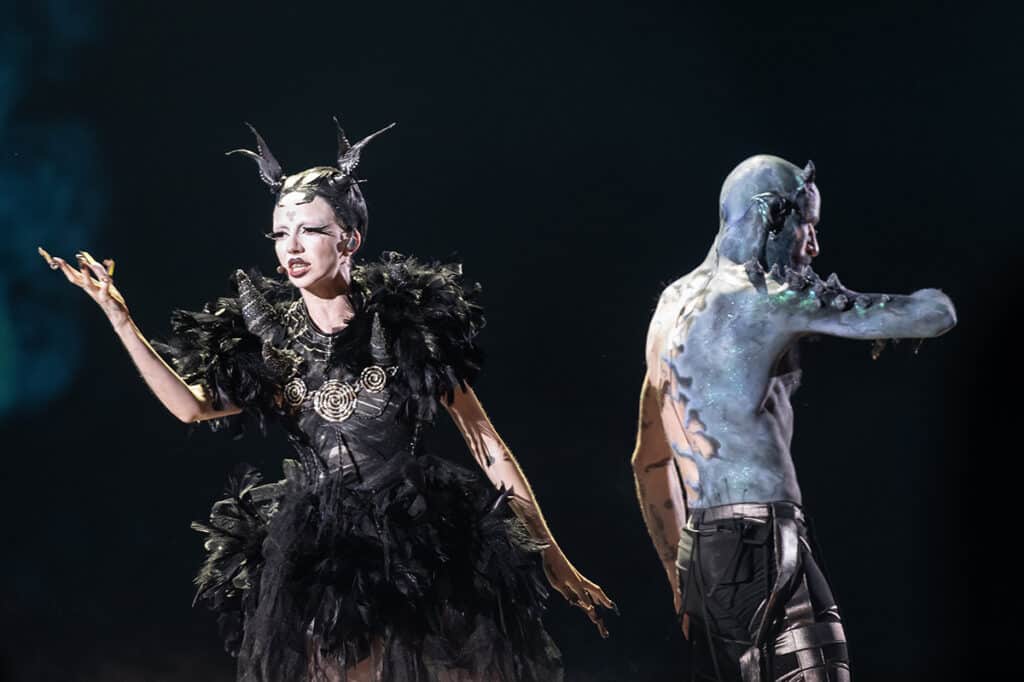
Israeli pop princess Eden Golan competed at the 2024 Eurovision Song Contest amid the war in Gaza and mass protests surrounding her involvement.
Thousands protested across Malmö, Sweden before the event to call for Israel not to compete, despite organizers insisting that Eurovision is “non-political.”
This year’s contest, which has been heavily branded with the slogan “United by Music” had not stopped calls for the 36 other participating countries to boycott, protests against Israel and Golan, and increased anti-Israel sentiment around the event.
Here’s everything you need to know about Israel’s participation in Eurovision and Eden Golan.
How did Israel perform in Eurovision?
Israel placed fifth in both the semifinals and Grand Final of Eurovision 2024.
Israel was propelled to its high placement through support from around the world. Israel won the popular vote in 14 countries and a new “country” — voters not located in a participating country. No nation awarded Israel a jury vote.
Out of all the countries participating, Israel came second in global votes, following only Croatia’s Baby Lasagna.
Why is Israel allowed to compete in Eurovision?
While “Euro” is in the competition’s name, a country does not have to be in Europe to participate.
Australia and Israel are both members of the European Broadcasting Union, the organization that puts on Eurovision, which makes them eligible to participate. Israel, the first non-European country allowed in the song contest, has won Eurovision four times.
Malmö unsuccessfully petitioned Eurovision to bar Israel from participating. A different initiative to ban Israel from Eurovision received 160,000 signatures and 20 performers dropped out of events for Eurovision as a result.
EBU Director General Noel Curran defended Israel’s ability to participate because Eurovision is supposed to be apolitical, but rather a celebration of music.
“Eurovision Song Contest is a non-political music event and a competition between public service broadcasters who are members of the EBU. It is not a contest between governments,” Curran said in a statement.
Some have called a double standard as Russia was barred from competing in 2022 after the war in Ukraine began.
Curran claimed that Russia was disqualified for not meeting broadcaster guidelines that Israel has met.
“Comparisons between wars and conflicts are complex and difficult and, as a non-political media organization, not ours to make,” he said. “In the case of Russia, the Russian broadcasters themselves were suspended from the EBU due to their persistent breaches of membership obligations and the violation of public service values.”
Eden Golan was booed on stage during her rehearsal
During her rehearsal before the semifinals, the crowd booed Golan as she performed her song “Hurricane.”
To prepare for the semifinal, Golan practiced singing as her team harassed her, allowing her to ignore the outside noise.
Israeli Eurovision contestant Eden Golan getting ready to face potential boos before her performance.
— Inbar Cohen (@InbarCohen13) May 9, 2024
The Eurovision Song Contest is supposed to be about celebrating music and unity, not letting politics overshadow the stage.
Eden, we stand strong behind you, and we wish you… pic.twitter.com/IRROvkOGhD
Following the booing, Golan said in a statement, “I am proud to represent my country, particularly this year. I am receiving support and love and I am determined to give my best performance tomorrow in the semifinal and nothing will deter me from that goal!”
The broadcast technology implemented by the EBU prevented the audience at home from hearing any booing during the live show.
While Golan’s performances seemed to go perfectly with no disturbances, videos revealed that the 20-year-old once again was booed by the crowd as they yelled “free Palestine” as she performed.
Anti-Israel protests have flooded Malmö
Both during Eurovision and outside the event, there have been multiple anti-Israel protests surrounding the festivities.
Swedish police brought in reinforcements from Norway and Denmark amid tens of thousands of anti-Israel activists taking to the streets. Hundreds of people chanted “free Palestine” outside Golan’s hotel window, protesting all day. There were expected to be more protesters than actual attendees of Eurovision, per JTA.

One hundred Swedish police officers were tasked with protecting Golan. Eurovision previously spoke out against harassment toward competitors after the Israeli delegation received death threats.
As a result, Golan was confined to her hotel room and did not participate in many of the Eurovision pre-contest events. Instead of the traditional “turquoise carpet” ceremony at Eurovision, Golan visited the Jewish Learning Center in Malmö for its Yom HaShoah event.
A festival dubbed “FalastinVision,” was set up to compete with Eurovision. The “genocide-free song contest” will run at the same time as Eurovision’s Grand Final and will have eight nations participate, including Palestine.
Malmö has a longstanding history with antisemitism and anti-Israel sentiments. The Swedish city has a Jewish population of only 1,000, but there have been multiple attacks on Jews by its white nationalist and Islamic radical communities.
When Malmö hosted Eurovision in 2013, there were reports of Israeli fans receiving antisemitic harassment while in attendance.
Anti-Israel sentiment at Eurovision
During the first semifinal, Eric Saade, a former Swedish Eurovision contestant who is Palestinian, wrapped a keffiyeh around his wrist. EBU ripped the performer, writing, “We regret that Eric Saade chose to compromise the non-political nature of the event.”
Irish participant Bambie Thug was forced to remove words “cease-fire” and “Freedom for Palestine,” written in the ancient Celtic language Ogham, from their makeup after their dress rehearsal. The 31-year-old later said she “cried” after Golan advanced to the Grand Final.

While Eurovision’s long standing flag policies only allow participation countries and Pride flags to be flown, Ynet reported that a man with a Palestinian flag was caught by security during the event and was escorted out.
Käärijä, a former Finnish competitor, recorded a dancing video with Golan before the event, but said he did not condone the video after it was posted to his and the Israeli singer’s social media accounts and was bashed by his anti-Israel fans.
Last year's Eurovision second-place finisher, Finland's Käärijä (aka the "Cha Cha Cha" guy), filmed a dance video clip earlier today with Eden Golan, and then publicly apologized for doing so and said it was not an endorsement. pic.twitter.com/iLDq0zBf0M
— Amy Spiro (@AmySpiro) May 9, 2024
The 2023 runner-up wrote on Instagram that he “happened to meet Israel’s Eurovision representative today and a video was filmed of us.”
However, he said the clip was posted “without my permission” and that he wished it was removed; it was later deleted from his and Golan’s accounts.
“I would like to clarify and emphasize that the video is not a political statement or an endorsement of any kind,” he wrote.
Golan refused to criticize those protesting her performance in an interview with Reuters.
“It’s up to the people what to do,” she said. “They have the right to speak their voice, but I’m focusing on my part which is giving the best performance, and on the good, on the good vibes, the good people.”
Lithuania’s performer, Silvester Belt, said that he regretted taking part in the Grand Final because he sang after Israel.
“Going after that country, with the crowd being so intense, was one of the worst things I had to go through,” he said.
Loreen, the 2023 winner of Eurovision, said that she would not have given Israel the trophy if Golan had won, despite being legally obligated to perform and participate in the trophy handover.
In addition, a Finnish representative reportedly refused to announce that her country had awarded points to Israel. Portuguese representative Iolande painted her nails during the Grand Final with Palestinian symbols, despite the EBU’s ban.
What was the controversy around Israel’s Eurovision submission
Initially, Israel submitted a song titled “October Rain” to be sung at Eurovision, which was rejected by the EBU for being too political.
“October Rain” referenced the Oct. 7 attacks and the hostage situation in Israel. To meet the parameters, the song was subsequently renamed “Hurricane” with changes to the lyrics.
Previously the song’s lyrics were “Those that write history / Stand with me,” and the chorus included the lines “And I promise you that never again / I’m still wet from this October rain.”
After Israeli broadcaster Kan refused to alter the lyrics, Israeli President Isaac Herzog said the song needed “necessary adjustments” so Israel could enter.
Eventually, Kan relented, changing the lyrics to: “Writer of my symphony, play with me / Look into my eyes and see” and “Baby, promise me you’ll hold me again / I’m still broken from this hurricane.”
Who is Eden Golan?
The Israeli pop star was born in Kfar Saba, Israel in 2003 to a Latvian father and Ukrainian mother. Her family moved to Russia when she was six, where they stayed for 12 years until Russia’s invasion of Ukraine. Golan previously said that while she is appreciative of her singing opportunities in Russia, she experienced a lot of antisemitism while living there.
Prior to leaving Russia to return to Israel, Golan was a member of Russian singing group Cosmos Girls. She competed in selection for Russia in the Junior Eurovision Song Contest in 2015 and later in “The Voice Kids.”
She performed a moving rendition of Aerosmith’s “I Don’t Want to Miss a Thing” wearing a yellow ribbon and surrounded by empty chairs to represent the hostages in Gaza to win “Rising Star” in February to become Israel’s Eurovision contestant.
After her move to Israel, Golan was criticized for previously performing in occupied Crimea and not being open in her criticism of the Russian government.
After Eurovision, Golan said that she plans on enlisting in the Israeli Defense Force.
Originally Published May 12, 2024 01:45PM EDT

